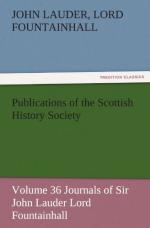[583] Duodecim Caesares,
Domitian c. 15. The soothsayer’s
power
of divination was tested by asking what his own fate
would
be.
He said he would very soon be devoured by dogs.
Domitian
desiring
to confute such uncanny powers of prediction ordered
him
to
be killed and securely buried. The funeral pyre
was knocked
down
by a storm, and dogs devoured the half-burnt remains.
That Touch which George Tomsone hes wes acquired by his father from the Melvines, who are designed Lairds of Dyserts, who again acquired it in 1472 from on Touch, so then they have bein of that Ilk.
Fingask, now McGill, ware Dundasses of before.
(2)
NOTES OF JOURNEYS IN SCOTLAND, 1671-72. [584]
Having past over to Fyffe about the latter end of August 1671, I went to Leslie. Saw by the way Finglassie and Kinglassy and Caskieberry, bought by a Gennan who came heir about 60 or 70 years ago, and professed medicine: was called Shoneir. His grandchild sold it to the chancellor, who hes also bought the barrony of Cluny, sometyme belonging to Crighton of St. Leonards. Saw Touch, neir Markinch. Saw Balbirny, sometyme Sir Alex’r Clerks, now it pertaines to a tailzeour called Balfour. Saw Balquharge belonging to Bogie’s unkle: then going for Couper, saw[585] Ramsayes forther,[586] now Pitcairnes by a marriage with the heritrix. Saw the hy way to Falkland, neir which stands Corston, whosse name is Ramsay: a sone wheirof was sir John Ramsay in K. James the 3ds dayes, and created by him Earle of Bothwell. He sent to the grammer scool of Edr. for a gentleman’s sone to wait upon him, and who could writ weill. 2 ware brought him to choise one, wheirof Jo. Ramsay was the one; the other wrot better, yet the king made choise of John as having more the mean of a gentleman then the other, and made him his cubicular. He gave him the lands of Taringzean in Air, and Karkanders in Galloway, Gorgie and Gorgymilne in Louthian, and Balmayne in the Mernis. Without licence from him none could wear a sword within 2 miles of the K.’s palace. He made him also captain of his guards, vide Buchanan, pag. 444 and 450. Anent his being Earle of Bothwel Buchanan causes some doubt, because in K. Ja. the 3ds dayes, at pag. 452, he mentions Adam Hepburne, Earle of Bothwell; but I think he is in a mistake, for Drummond is formally contrare. The time of his death is controverted: some say he was killed at Stirling field with K. Ja. the 3’d, others (amongs whom is Mr. Androw Ramsay in his poems) at Flouden with Ja. the 4’t. Whoever on Ja. the 3’ds death the title of honor conferred upon him was retracted; but he was not legally forfault nather in Parliament nor in a Justice court, so that the familie of Balmayne might the more easily be restored againe to that honor. He was the first in Scotland that ever got a patent of nobility. Buchanan




